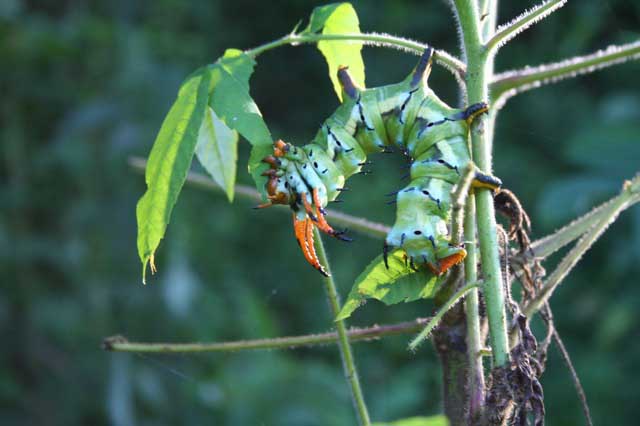West Virginia Counties
This distribution chart is a compilation of information from Paul
Opler's Moths of North America Website, the Lepidopterists'
Society Season Summary and personal communication with many
residents (past/present) of West Virginia. See comments below the map.
Actual
ranges may, in many cases, be more expansive than noted.
Most species are probably widespread. Although no specific counties
are given for Sphingicampa bicolor, I suspect it occurs throughout the state.
Clicking on a
scientific name will take you to a file with pictures and/or
information.

Citheronia regalis fifth instar, Wayne County, West Virginia,
August 2010, courtesy of Christa Marcum.
Deborah Meyers confirms Eacles imperialis and
writes, "We live in Morgantown
(Monongalia County), West Virginia (about one hour south of Pittsburgh,
PA). We were walking in the woods near Snake Hill Road here and
foung a HUGE green caterpillar with some very colorful spines(?) and
dots. It was a beauty! Naturally, we had to bring it home and make
it a home in an empty coffee can. After a couple days, it began to
darken and get less and less active. We were afraid it was dying.
Then, several days later (having forgotten to check for a couple days),
I opened the lid, fearing the worst, and found....a pupa! Also, a
shedded skin (?). The pupa is dark brown, about 2 and 1/4 inches
long and 3/4 inch wide. There is no sign of a cocoon. The pupa has
a pointy spine-like thing at one end."
Ernie De Marie writes, "I caught the following in
mid July in my birthplace of Bluefield, (Mercer County) West
Virginia: io, polyphemus (several), promethea, luna,
regal, imperial,
and some sphinx moths, but I cannot remember the species."
Elliot Krafsur writes, July 7, 2001, "I've collected insects in Maryland: Pr Georges Co; Montgomery Co., Washington Co, Frederick Co,
(I lived in each of these places at one time or another).
"Now in Jefferson Co, WV.
"Here's a list of Saturniidae I've recorded in each county over years (beginning in 1952):
C. promethia, C. angulifera, A. polyphemus, A. luna,
D. rubicunda, C. regalis, E. imperialis, A. io."
Non-member Cheryl Jennings reports Callosamia promethea, Actias luna, Antheraea
polyphemus, Automeris io and Dryocampa rubicunda
from Jefferson County.
Goto County Distribution Map
Return to State by State Listings
Goto to Main Index
Visit West Virginia Sphingidae
Visit West Virginia Catocala

